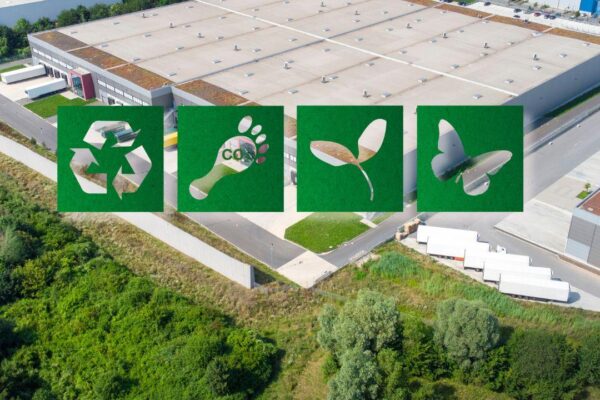The shift toward sustainable production practices has spurred growing interest in low-carbon materials that support greener industrial processes. Emerging materials, like fungi-based building panels and plastics sourced from oceans, are less in GHG emission, being no longer niche innovations materials but are stepping into real-world manufacturing pipelines.
Several materials types stand out and are gaining traction in sustainable manufacturing: mycelium-based composites, agricultural waste-derived biocomposites, and recycled ocean plastics.
Other article: Mikroorganisme dan Perannya dalam Menyeimbangkan Daur Karbon
Table of Contents
ToggleMycelium-Based Composites: Organic Growth with Industrial Potential
Mycelium, the root structure of fungi, can be used as a natural binder to create lightweight, durable, and compostable materials. When grown with agro-industrial waste such as bamboo sawdust and corn pericarp, mycelium forms composites that are ideal for insulation, packaging, and interior building materials.
A 2024 study by Aiduang et al. found that different species of fungi could effectively convert biomass waste into green composites, offering a sustainable alternative to synthetic materials in interior construction and design.
Not only are these materials biodegradable, but they also reduce waste streams by utilizing agricultural by-products, making them a circular and low-impact solution.
Their adoption in construction and product design could reduce reliance on carbon-intensive materials like plastics and foams. Beyond construction, experimental uses are emerging in fashion accessories, furniture design, and event booth architecture, showing how flexible this biomaterial could become in replacing harmful synthetics.
Agricultural Waste-Based Biocomposites: Turning Trash into Industrial Treasure with Less GHG Emission
Beyond fungi, another promising material innovation comes from agricultural waste. Biocomposites developed from residues such as rice husk, coconut shells, and sugarcane bagasse are being used to reinforce biodegradable polymer matrices. These composites find applications in packaging, automotive parts, and lightweight construction materials.
This approach not only diverts waste from landfills but also cuts down the need for virgin raw materials, aligning with green manufacturing goals. With mechanical properties comparable to conventional materials, these biocomposites represent an important leap forward in combining sustainability with industrial performance.
Their relatively low cost, especially in regions with abundant agricultural activity, makes them highly scalable. As the demand for green materials grows, companies can also take advantage of regional biomass availability to localize production, cut transport emissions, and support rural economic development through inclusive value chains.
Recycled Ocean Plastics: Closing the Loop on Marine Waste
Recycled plastics, particularly those retrieved from ocean and coastal waste, are becoming a hallmark of responsible manufacturing.

Oceanworks, a global marketplace for ocean plastic solutions, connects businesses with verified sources of recycled ocean plastics. These plastics are reprocessed into pellets and resins that can be used for packaging, textiles, and even consumer electronics.
The environmental impact of such practices is twofold: reducing plastic pollution in marine ecosystems and lowering the GHG emissions associated with virgin plastic production..
Building the Future with Smarter Materials
The path to low GHG emission manufacturing isn’t just about cutting emissions. Instead, it’s about rethinking what materials we use and where they come from. Mycelium composites, agricultural waste biopolymers, and recycled ocean plastics demonstrate that sustainable materials can also be high-performing and commercially viable.
For businesses aiming to transition toward greener practices, adopting these materials offers not only environmental benefits but also a strategic edge in an increasingly eco-conscious market.
About Satuplatform
Satuplatform offers a holistic service with comprehensive features to achieve your sustainability goals by staying ahead of the game and supporting measurable climate management strategies. Satuplatform’s features enable companies to:
- collect and analyze ESG data accurately and efficiently;
- calculate, manage, and set emission reduction targets that are essential to reducing the impact of carbon footprints;
- prepare ESG reports that meet international and national standards.
Satuplatform’s team of experts are experienced in the field of business sustainability and are ready to help understand your needs and implement solutions
Find more information through FREE DEMO and get ready to make a more optimal contribution in decarbonization.
Similar Article
Low GHG Emission, High Impact: Everyday Materials That Could Reshape Green Manufacturing
The shift toward sustainable production practices has spurred growing interest in low-carbon materials that support greener industrial processes. Emerging materials,…
Does “Eco-friendly” Labels Mean Green Product in Green Industry?
Businesses and consumers alike are navigating a flood of products claiming to be “eco-friendly” or “green.” These labels, often used…
Dilema Biomassa: Transisi Energi Berkelanjutan atau Perusakan Lingkungan?
Dalam upaya mencapai target net-zero emission pada 2060, Indonesia mendorong transisi energi dari bahan bakar fosil ke sumber energi terbarukan.…
Energi Terbarukan di Indonesia: Mengapa Surya dan Hidro Menjadi Pilihan Utama?
Sebagai negara kepulauan terbesar di dunia, Indonesia menghadapi tantangan besar dalam memenuhi kebutuhan energinya. Di tengah komitmen untuk mencapai net…
Emisi Karbon Penerbangan Meningkat: Tantangan Baru bagi Industri Aviasi
Emisi Karbon Sektor Penerbangan Setelah mengalami penurunan drastis selama pandemi COVID-19, industri penerbangan global kini menunjukkan pemulihan yang signifikan. Namun,…
Adaptasi Bisnis di Era Krisis Energi
Pasokan bahan bakar menjadi semakin terbatas, dengan harga yang melambung tinggi, merupakan salah satu bukti bahwa dunia sedang mengalami krisis…







